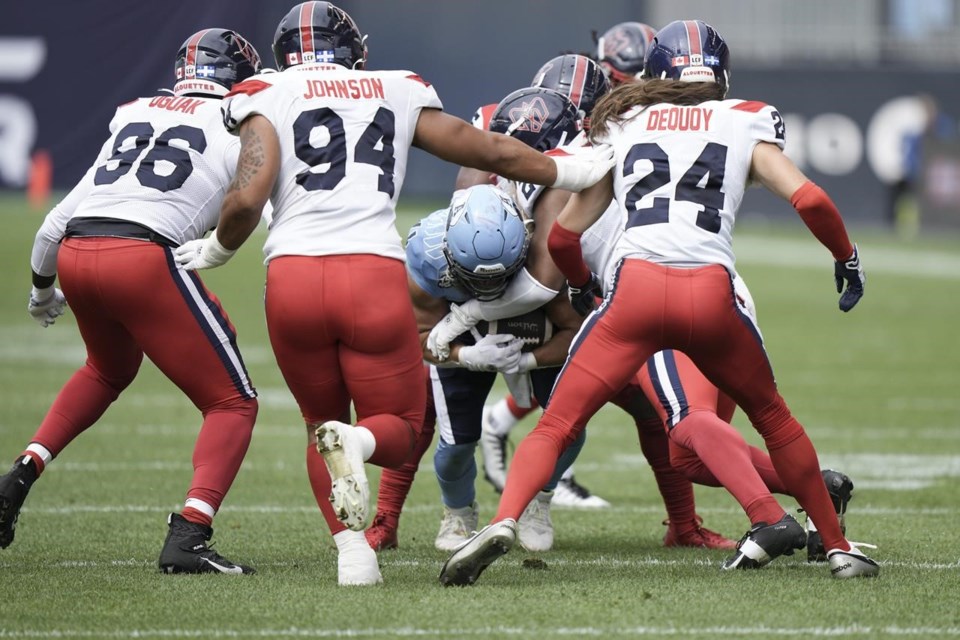GUELPH, Ont. — He missed time last season with a concussion but Toronto Argonauts receiver Tom Nield won't be wearing a Guardian cap in CFL games.
The CFL announced Wednesday it was giving players the option of wearing the soft protective helmet covers during games this season. But the league did make mouthguards mandatory, adding violations will be deemed as dress-code offences and subject to fines.
The six-foot-three, 203-pound Nield, of Guelph, Ont., appeared in nine games last season but still established career highs in catches (32) and yards (384).
But the former McMaster star has no plans to wear the Guardian cap in games.
"I haven't really given it much thought but to be honest I'd rather not wear it," he said. "I've played football long enough without it so I'm not looking to really change anything."
The CFL mandated use of Guardian caps last year during training camp and all regular-season contact practices. All offensive and defensive linemen, running backs and linebackers must wear them and Wednesday the league extended that to defensive backs and receivers.
According to the CFL, the introduction of Guardian caps and other measures led to a 42 per cent decrease in training-camp concussions.
Nield has an easier time with the league's mouthguard rule, adding he already wears one in games.
Argos tackle Dejon Allen, the CFL's top lineman last season, said he'd consider wearing the Guardian cap in a game if modifications were made.
"I might if they made it smaller and could adjust it to make sure it stayed on the helmet because I'm all about protection," he said. "But for right now, I'm just going to not have it on."
The six-foot-two, 300-pound Allen said while the headwear might weigh mere ounces, he does notice a difference with it on.
"It's a little heavier so I prefer to have it off," he said. "But like I said, if they made it a little smaller and it fit real good on the helmet, then I might consider it."
Allen also wears a mouthguard in games.
Toronto head coach Ryan Dinwiddie isn't surprised that players aren't keen about wearing the headgear in games.
"We're supportive of player safety and players being able to choose," Dinwiddie said. "But they don't really like wearing them in practice.
"They feel like they're heavy on their necks and almost feel like it does more harm than good when they actually do bang heads. But if a player wants to do it we're definitely not going to discourage it."
Toronto players aren't the only ones balking at wearing the Caps in games. Winnipeg centre Chris Kolankowski says he definitely won't don one this season but appreciates the data that suggests they do help.
"I don't like them based on feel but I did the CFL/CFLPA mentorship this year and their player-safety personnel actually showed the research from the NFL and the research supports it," he said. "I won't be doing it but if some guys want to do it, I respect it … if you feel safer with one, go ahead and I don't think there will be a stigma (attached) to wearing them.
"It's heavy, it's hot and I feel what would be a glancing blow with a helmet where you kind of skim off each other, it's more of a stick and so you feel it more sometimes. Honestly, that's all probably growing up without it … I probably played 20 years of football before I had to wear one so let's be honest, it's probably just because of that."
And like other players, Kolankowski already wears a mouthguard when he plays.
So does Bombers quarterback Zach Collaros, but the two-time CFL MVP would rather that be left up for individual players to decide.
"If you are somebody who hasn’t worn one for 15 years, it’s tough to get used to something that’s such a habit," he said. "I don’t love mandatory stuff, I mean, we’re all adults here.
"I've always worn one … I just feel comfortable wearing it because it’s probably a habit at this point."
Collaros has endured concussions over his CFL career. He said he has tried on a Guardian cap and didn't find it too bad.
"Honestly, when I had it on I didn’t even notice it," he said. "I know some guys say that it affects them.
"I might have had it on wrong. I don’t really know."
Toronto quarterback Cameron Dukes echoed Collaros's sentiments.
"I wouldn't say they're a hindrance," he said. "I don't know (if they work) because I haven't taken any hits, thank goodness.
"But, yeah, I'd consider (wearing it in games). It will be a game-time decision."
Collaros, 35, can see the day when wearing Guardian caps will become mandatory in football.
"I wouldn't be surprised if in five years everybody has to wear one," he said. "If the research and the data suggest this is a better way of doing it, I wouldn’t be surprised if at some point the NFL makes the move first and says, ‘Hey, this is a mandatory thing,’ and then we follow suit.
"I’ll probably be gone by then, though.”
---
With files from Judy Owen in Winnipeg.
This report by The Canadian Press was first published May 16, 2024.
Dan Ralph, The Canadian Press



